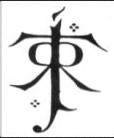Shire
An area of NW Eriador settled by migrating Hobbits around TA 1601 and occupied almost exclusively by them thereafter.
The Shire was originally a part of the kingdom of Arnor, and by the middle of the Third Age was almost uninhabited. In TA 1601, King Argeleb of Arthedain granted the lands east of the Baranduin (Brandywine River) to hobbits from Bree to settle in.
The Shire was originally 50 leagues north to south, and 40 leagues east to west and consisted of the lands between the Brandywine River and the Far Downs. It was divided into four Farthings. The Northfarthing seems to have been mostly moorland and pasture and sparsely populated, while notable communities of the Westfarthing included Hobbiton, Bywater and Michel Delving, which was the principal town of the Shire. The Southfarthing included Sackville and Hardbottle, and its mild climate allowed the growing of grapes and tobacco (pipe-weed). The Eastfarthing was bounded by the Brandywine River and was of very varied terrain, from hilly wooded areas to marshes with rich farmland between. The villages of Frogmorton and Whitfurrows lay there along the east/west road which left the Shire by the Brandywine Bridge.
In TA 2340 the Shire was expanded to the east when the Oldbucks settled in Buckland between the eastern bank of the Brandywine River and the Old Forest. There they established Bucklebury, and its ferry which connected them to the rest of the Shire. Centuries later in the year 30 of the Fourth Age the Shire again expanded when Aragorn (King Elessar) , gifted the westward lands between the Far Downs and the Tower Hills, to the Shire, naming it the Westmarch.
Only Hobbits lived permanently in the Shire, and although Elves and Dwarves passed freely along the east/west road, the Shire was forbidden to Men from the start of the Fourth Age by decree of King Elessar, who applied this dictate even to himself, meeting his hobbit friends at the eastern end of the Brandywine Bridge.
The Shire had an internal postal service, a system of law and order, and legal representation. Trade with the wider world gave the better off Hobbits access to tea, coffee, china, glassware, fancy goods and some mechanical devices such as clocks.
NOTE: Additional information from Cirdaneth
The Shire was originally a part of the kingdom of Arnor, and by the middle of the Third Age was almost uninhabited. In TA 1601, King Argeleb of Arthedain granted the lands east of the Baranduin (Brandywine River) to hobbits from Bree to settle in.
The Shire was originally 50 leagues north to south, and 40 leagues east to west and consisted of the lands between the Brandywine River and the Far Downs. It was divided into four Farthings. The Northfarthing seems to have been mostly moorland and pasture and sparsely populated, while notable communities of the Westfarthing included Hobbiton, Bywater and Michel Delving, which was the principal town of the Shire. The Southfarthing included Sackville and Hardbottle, and its mild climate allowed the growing of grapes and tobacco (pipe-weed). The Eastfarthing was bounded by the Brandywine River and was of very varied terrain, from hilly wooded areas to marshes with rich farmland between. The villages of Frogmorton and Whitfurrows lay there along the east/west road which left the Shire by the Brandywine Bridge.
In TA 2340 the Shire was expanded to the east when the Oldbucks settled in Buckland between the eastern bank of the Brandywine River and the Old Forest. There they established Bucklebury, and its ferry which connected them to the rest of the Shire. Centuries later in the year 30 of the Fourth Age the Shire again expanded when Aragorn (King Elessar) , gifted the westward lands between the Far Downs and the Tower Hills, to the Shire, naming it the Westmarch.
Only Hobbits lived permanently in the Shire, and although Elves and Dwarves passed freely along the east/west road, the Shire was forbidden to Men from the start of the Fourth Age by decree of King Elessar, who applied this dictate even to himself, meeting his hobbit friends at the eastern end of the Brandywine Bridge.
The Shire had an internal postal service, a system of law and order, and legal representation. Trade with the wider world gave the better off Hobbits access to tea, coffee, china, glassware, fancy goods and some mechanical devices such as clocks.
NOTE: Additional information from Cirdaneth
Encyclopedia entry originally written by PotbellyHairyfoot








